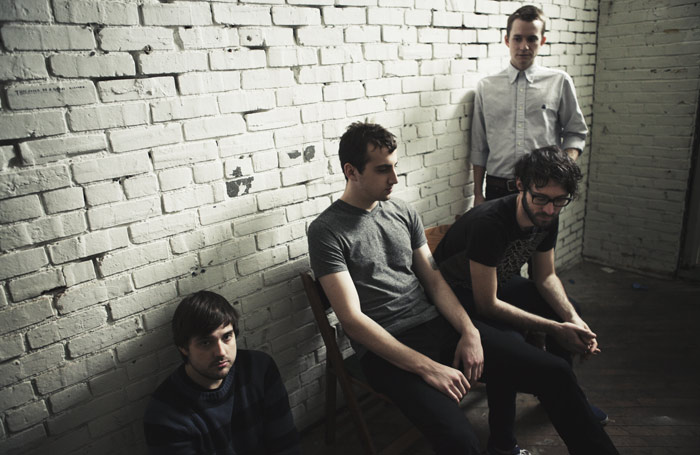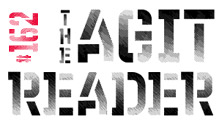
Ancient Melodies of the Future
by Jennifer Farmer
Cymbals Eat Guitars are an interesting band. They call New York City home, but don’t live in Brooklyn, or even Manhattan. They choose to stay in sleepy Staten Island, away from the music meccas. Perhaps their sound is more unique for it, but they won’t admit to it. They are a quartet of humble dudes who aren’t afraid to seek help when it’s needed. Despite the stress that comes with members leaving and holding auditions for replacements (all while writing a follow-up to a critically praised debut album), they’ve managed to keep a tight focus on the future, while refining their much buzzed about sound. Their charmingly hazy and sweeping, chaotic melodies have earned comparisons to Built to Spill and various other ’90s indie-rock bands, but they aren’t even old enough to have experienced Dough Martsch in his heyday. After listening to tracks off their forthcoming record, Lenses Alien, however, it becomes a moot point. Cymbals Eat Guitars have solidified their own sound, grown as a band, and are truly coming into their own.
I had the opportunity to catch up with Joe D’Agostino, lead vocalist and guitarist, via phone last week, and he spoke of these trials, as well as the band’s bright future.
You guys are from Staten Island, and I can honestly say that I haven’t heard much music from Staten Island. Does it ever feel like you’re living in the “other” borough with Brooklyn being so close?
Joe D’Agostino: We’re all from New Jersey, and I moved to Staten Island when I went away to college and I’ve been here since. It’s quiet, and I’m okay with that. From an artistic standpoint, it’s good to be in isolation and not really be a part of a musical community at all, which I guess we’re not. That’s not to say that all bands in Brooklyn sound the same or something, but I feel like we have our thing going on over here.
How did you guys end up staring the band?
JD: Matt Miller (drums) and I have been in bands together since 10th grade, and when we went away to college, I kept playing music. During the summers, we would get together and play my songs and sometimes record them. That’s kind of how it started. Matt Whipple (bass) joined about a year and a half ago after our bassist quit sort of unceremoniously after the first U.S. tour. Brian (Hamilton, keyboards) joined shortly before he did. Both of them just tried out, and we were lucky enough to find guys that were perfectly suited for the job.
Did you record most of the early stuff yourselves then? How’d that translate into a record?
JD: Yeah. When Matt and I first started recording together, I just had a 12-track digital recorder and a condenser microphone. He would lay down the drums, and then I’d lay everything else down. For our first record, I wrote all the bass parts, the guitar parts, and everything. It’s not like that anymore, though, because I have people around me that I trust. There’s more collaboration now. I know it’s a cliche, but I feel like this second record really came together and solidified us as a band. Everyone played a huge role and that’s honestly how it played out. We worked together for a long time and got really tight, and now we’re used to bouncing ideas off each other and functioning in that way. It’s a lot better.
Cliche or not, it shows on the record. You can really tell you guys are a lot more comfortable and settling into a distinct sound.
JD: Thank you. Like I said, the touring, playing and spending so much time together really helps, and if it comes off sounding that way, a large part of that is because of John Agnello. He’s amazing at capturing the live energy of bands in rooms.
Aside from the opportunity to work with John, how does Lenses Alien compare to your last album?
JD: Well, besides hunkering down, figuring out arrangements and really nailing down a routine this time around, I struggled for months during our last tour for Why There Are Mountains to keep my voice every night. So last May, I began seeing a vocal coach in Manhattan and I’ve really come a long way in just a year. I’ve gotten my voice to where it’s easier to manage and I sing more effectively. As the songs get more complex and more demanding, you need to be able to handle it every night. That’s a big step forward this time around, I think.
That’s pretty humble to seek out help.
JD: Yeah, I mean, I had to. I’d wake up in the morning and I wouldn’t be able to talk until soundcheck. That, combined with other sources of external stress that come with touring—being in van, not sleeping well, etc.—was a recipe for disaster. Unfortunately, vocals are usually the first thing people notice about a band, and it kind of defines the sound to a certain extent, so we just needed to make sure that was up to par. I’d hate to get lumped in with bands that make a decent record, but then don’t sound good live. That might have been what we were to some people for a while—who knows—but hopefully not anymore.
You guys did tour in support of Why There Are Mountains for quite awhile. Did there come a time that you felt you were ready to sit down and write and record again?
JD: Sure. While we were on tour, we tried to start working on new material as best as we could piecemeal between shows. We actually ended up writing about half of the new album then. We supported The Thermals on their U.S. tour, which ended in October. We wrote the rest of the record between October and March and recorded it in March. Since then, we’ve just been biding our time and practicing until we go back on the road.
Are you a fan of touring or is it just part of the job, so to speak?
JD: I really like touring when I don’t get sick. I’m prone to getting really ill while touring, mainly when we fly overseas. For some reason, I’ll almost certainly come down with some debilitating illness. It’s crazy. Whipple is sort of the same way, so we’re sick buddies on tour, loading up on vitamin C and always worrying about whether we’re going to be able to play. But I love it when I’m healthy. There’s nothing better. With more means, it would be even nicer I’m sure, like to be able to explore a city for the whole day rather than getting in at 5pm and soundchecking and playing. But I’m not complaining at all. I’m definitely not Bradford Cox or someone that’s constantly writing stuff and wanting to record it. Once the record is done, I’m anxious to just go play the songs.
How would you describe your sound in your own words? A lot of writers compare you to various ’90s bands (Built to Spill, Pavement, etc.). Do you think that’s apropos?
JD: I guess I hear that too, to a certain extent, especially on the last album, when I was still mining the bands I used to listen to a lot in high school: Pavement, Modest Mouse, Bedhead and Trail of Dead. But I think our pallet has definitely expanded at this point, with new people joining the band and having different influences. If I had to choose, I’d say I hear a bit of Sonic Youth in what we do, I hope. Whipple and I are huge Sonic Youth fans, but I also think there’s a more bombastic, weird element to what we’re doing now. Also, I’m really into shoegaze, and the tremelo and gliding thing has become my go-to lately.
Your band name comes from a Lou Reed quote (describing the sound of the Velvet Underground). Where does the new album title come from?
JD: Lenses Alien was originally the title of the first song, which is now “Rifle Eyesight.” It pops up in the lyrics a few times throughout the song. I guess it’s kind of appropriate because the lyrics deal with wonder and bewilderment with the physical world, sort of trying to see things in a... it’s hard to describe. I should have prepared for this question. I don’t have a stock response yet.
I think I prefer the off-guard response! At least you haven’t been asked the same question a hundred times yet today.
JD: Yeah, now you just get kind of the jumbled, stammering pseudo-response. The name just seemed appropriate. That’s how the first record was named too, with lyrics from the first song that just seemed especially resonant and could sort of comment on what comes after.
